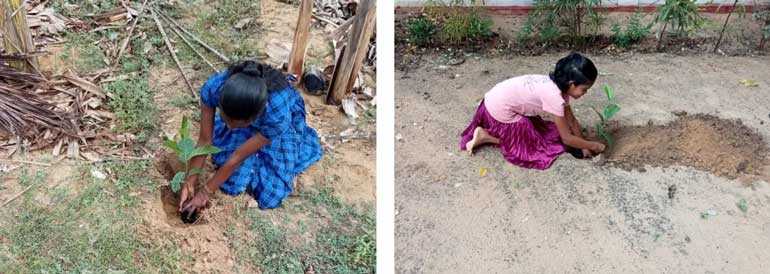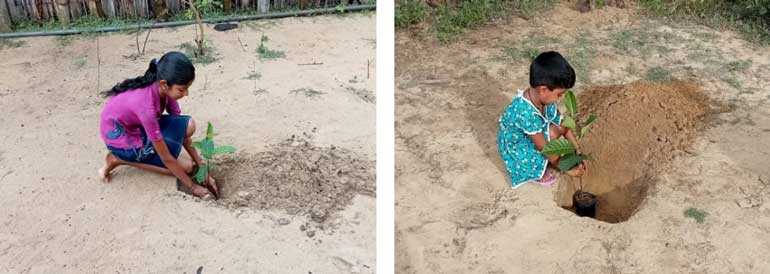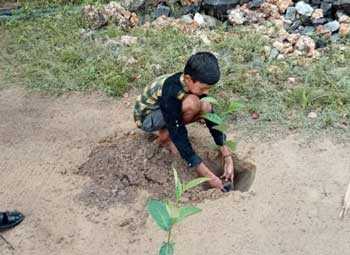Monday Feb 23, 2026
Monday Feb 23, 2026
Saturday, 22 May 2021 00:22 - - {{hitsCtrl.values.hits}}


By Surya Vishwa
In the last edition, the Harmony page highlighted the facilitation of a north-south link for human wellbeing and entrepreneurship creation. We thank those who responded and hope to follow up thoroughly on this endeavour once the lockdown ends.
For those who may not have read the article, it can be seen at http://www.ft.lk/harmony_page/Initiating-facilitation-of-Lankan-north-south-link-for-human-wellbeing-and-entrepreneurship-creation/10523-717531.
This initiative was part of the promotion of May as a month of peace by the Harmony page with the encouragement and support of Daily FT Editor Nisthar Cassim.
May, as we know, is a month that brings to mind many emotions of diverse nature amongst Sri Lankans. It is a month in which terrorism was ended militarily and gave the country a chance to think about why such terrorist organisations arise and what the nation should do in terms of wise leadership to prevent such calamities. We can ask ourselves whether we have learnt any real lessons from the past and each of us think of ways we can individually contribute to make Sri Lanka into a model country of unity and wellbeing.
Peace comes first
 Peace or the instilling of peace is first and foremost an internal aspect. It is only when an inner spirit of peace is achieved that peace in the surrounding can be created.
Peace or the instilling of peace is first and foremost an internal aspect. It is only when an inner spirit of peace is achieved that peace in the surrounding can be created.
Every single spiritual path without exception highlights inner peace. But we have the strange situation in the world where these paths are divided alongside political and power based lines creating a base for conflict. Probably we could take a cue from ancient aborigines and how they looked at the natural world and divinity in humans and nature.
In this instance, where Sri Lanka is concerned rather than dwelling on war or peace or victory or defeat or patriotism or terrorism let us begin by focusing on mother earth. We are born to different locations of mother earth that we segment as nations and in these patches of earth (nations) there are different types of animal and plant species and people with different skin colour and habits, cultures and ancient knowledge. There are old civilisations and ancient knowledge that should be protected for posterity for the good of man.
Natural heritage
Sri Lanka, this patch of earth that makes up this civilisation (referred to as Hela Deepaya in ancient times) is one of the oldest civilisations in the world. We have range of natural heritage and a range of cultures and traditions evolving through history which we could use to live beautiful and fulfilled lives. We live in a land which although small compared to many other lands which make up nations, is still nevertheless very diverse in soil texture enabling the thriving of diverse plant life in different locations.
The human mind which is closely entwined with nature is an evolved and enlightened mind. This is why all ancient sages and spiritual seekers have been associated with mountains, deserts, caves and forests and not townships.
A human being is an integral part of the natural world. The natural world, the trees, the oceans and rivers are not judgmental and prejudiced as humans; they do not think alongside petty parameters of exploitation and power. The model of education set up by those of the Western world and passed onto different cultures with ancient methods of knowledge such as ours, was to suit an industrialised world and in doing so distanced people from nature.
Our return to ourselves, our inner consciousness and our sustainability in health and true wealth, equanimity and human progress is through nature. In the brick made prison like structures that are the modern schools of today we hardly motivate children and teachers to enrich the earth and society by planting food giving trees. In Sri Lanka chemical agriculture has devastated and made extinct indigenous plant species and children grow up without knowledge of these or their medicinal value.
The joy can be immense of watching a small seed take root and grow amidst the earth, holding the potential of becoming a large tree. Yet children and adults live separated from this joy in our everyday lives, especially in the city as they pursue purely material goals. Even in some rural areas what is interpreted as ‘food’ and ‘drink’ are often ‘fashionable’ imported illness causing substances.
Yet there are many persons in this country in whom the fad of modernity has not eradicated the link with the earth and trees and who silently, without fuss and publicity strive to encourage children, youth and adults alike to put back to earth the countless fruit and vegetable seeds.
Jackfruit, the ‘bath gaha’
The Harmony page acknowledges persons such as Dr. Sudath Rohitha who has been on a silent drive to plant jackfruit in various locations in the country as a means of fighting hunger and enabling agro/medicinal industries. Jackfruit has accrued for itself the identity of being a ‘bath gaha’ for Sri Lanka and boasts of different varieties. It has saved Sri Lanka from hunger during the 1940s and 1970s and early last year during COVID-19 lockdown.
Those such as biodiversity forest garden concept promoter, Ranjith Senevirathne, Analogue forest initiator Dr. Ranil Senanayake and Ayurveda and Sinhala wedakam indigenous physician Palitha Shri Gagana Arachchcige are some of the other nature-based warriors who bestow on Lankan soil diverse plants of nutritional and medicinal value.
Physician Arachchige has initiated the cultivation of indigenous vegetables/herbs and done detailed analysis on the medicinal value of jackfruit. Countless persons in diverse professions ranging from teaching to the military have on their own volition motivated the non-wasting of plant seeds and cultivating them wherever possible.
Retired Major General Ubaya Madawela who has cultivated hundreds of different fruits and medicinal/vegetation based trees in Kataragama area and other locations have initiated and given leadership to many tree cultivation programs while in the military as a means of bringing people together as well as preventing natural disasters.
He is currently working with schools to help children better link with nature and states that all children should be inculcated with the ethic of collecting different fruit/vegetable seeds into a bag and enabling these to take root on soil wherever there is an opportunity. The wood apple fruit he cites as an example which has many seeds in one fruit which could lead to the birth of hundreds of nutrition-providing trees when planted and notes that several of young military personnel under his motivation have done such cultivation, either on their own land or those of others.
We humans who love to appropriate things especially land, are often beguiled into thinking that we must have our very ‘own’ land to plant a tree. However as per the universal intelligence which governs all of nature, for a human being who considers himself as part of nature and selflessly helps into life a plant, non-discriminating whether the land is his ‘own’ or not, the reciprocating ‘richness’ maybe far higher than a person boasting of large scale land ownership but who has not trained in himself this selfless thinking.
Jackfruit tree planting
 As Sri Lanka marks the 12th anniversary of ending the war in May 2009 maybe the wisest way we could commemorate this occasion is by planting a tree, especially a medicinal or food bearing tree – whether in the north or the south.
As Sri Lanka marks the 12th anniversary of ending the war in May 2009 maybe the wisest way we could commemorate this occasion is by planting a tree, especially a medicinal or food bearing tree – whether in the north or the south.
The Harmony page is therefore pleased to have initiated jackfruit tree planting by children of the North of Sri Lanka, namely Kilinochchi and Mullaitivu last week. Jackfruit is referred to as ‘kos’ in Sinhala and ‘paalaka’ in Tamil. These plants were grown by children aged between six and 16, in diverse locations of the north and given leadership to by some of the beneficiaries of the Sri Lankan Government’s de-radicalisation and rehabilitation program for ex-LTTE members from 2009 to 2012.
Sri Lanka is the only country in the world to pardon members of an entire fighting force of an internationally proscribed terrorist organisation who surrendered and enabled them to be successfully de-radicalised, rehabilitated, re-educated and re-integrated back to society. Many of the trees were planted by children of these persons, most of whom this writer met in a detailed research based visit undertaken with the needed authoritative permission last month to find out the social issues faced by the north-east population.
The Harmony page initiative of planting jackfruit trees in the North of Sri Lanka to commemorate May as a month of peace, was linked to our joint efforts with academic and mineral engineer Dr. Sudath Rohitha to encourage jackfruit cultivation in the whole of Sri Lanka as a means of educating the masses on its food and medicinal value also for local and export based small and medium scale industries.
According to local and international research jackfruit holds vast medicinal and nutritional properties ranging from its young leaves and bark being effective for treating diabetes, its seeds for giving vigour to the body and the pulp in preventing cancerous cell growth. Although largely underestimated in Sri Lanka, internationally jackfruit is recognised for its vast medicinal properties. The range of food based potential of jackfruit is immense and holds the possibility of producing flour and flour based products and producing snacks ranging from pancakes, pizza, vade and toffee.
At a time when the threat of immunity is what affects us in the form of this marauding pandemic called the coronavirus which does not differentiate between caste or ethnicity or religion, we can cultivate trees such as jackfruit that will give us the guarantee of immunity boosting.
It should be noted that mono-cropping is not the best method for soil enriching and it is best that diverse trees are planted in close proximity, if that is practically possible. At the root of the plant dried leaves and twigs can be gathered to retain moister from rain.
To conclude; let us note that we are all equal beneficiaries of Mother Nature. None of us are superior or inferior. Let us therefore commemorate this month of May which has significance to Sri Lanka, as a month of peace and do anything to merit this purpose including gifting fruit, vegetable and shade-giving seeds to persons we know for planting as symbols of peace.
We call upon adults who work with children in diverse capacity to use the rest of the days of this month to promote this concept of tree planting to commemorate May as a month of peace in Sri Lanka and continue to think of each and every month as that which could enhance communal harmony.
Let us wish upon this land peace, stability, unity and appreciation of our indigenous knowledge for the common wellbeing of all.